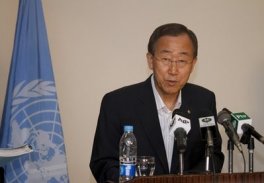Ban Ki-moon, the UN secretary-general, has said that the Pakistan floods are the worst disaster he has ever seen and has issued a fresh call for international aid to help those affected by the crisis.
Speaking alongside Asif Ali Zardari, Pakistan's president, after a tour of the disaster zone, Ban said on Sunday it had been "heart-wrenching day."
"I will never forget the destruction and suffering I have witnessed today," he said. "In the past I have witnessed many natural disasters around the world, but nothing like this.''
The UN has appealed for an initial $460 million to provide emergency relief, but only 20 per cent has so far been given.
"Waves of flood must be met with waves of support from the world,'' said Ban. "I'm here to urge the world to step up assistance.''
The floods began more than two weeks ago and have hit about one-quarter of the country. Huge swathes of land remain under water, and hundreds more homes
were flooded over the weekend. Twenty million people are believed to have been affected.
Ban's visit comes a day after the UN confirmed the country's first case of cholera in Mingora, in the northwestern district of Swat, raising the spectre of a disease outbreak over an already bleak situation.
Maurizio Giuliano, spokesman for the UN Office for Humanitarian Affairs, said at least 36,000 people were reportedly suffering from acute watery diarrhoea.
"We're not suggesting that everyone who has acute watery diarrhoea has cholera, but cholera is certainly a concern and that's why we're stepping up our efforts," he said on Saturday.
Relief effort criticized
The United Nations has appealed for $460m to deal with the immediate aftermath of the floods, but charities and officials said the figure falls far short of what is needed.
"The floods affected some 20 million people, destroyed standing crops and food storages worth billions of dollars, causing colossal loss to national economy," Yousuf Raza Gilani, the Pakistani prime minister, said.
"I would appeal to the world community to extend a helping hand to fight this calamity," he said on Saturday.
Charities said relief for those affected by the disaster, which has left more than 1,600 people dead across the country, was lagging far behind what was needed.
"There are millions of people needing food, clean water and medical care and they need it right now," Jacques de Maio, head of operations for South Asia at the International Committee of the Red Cross (ICRC), said.
"Clearly at this point in time the overall relief effort cannot keep pace with the overall scale of the emergency."
Humanitarian agencies in Pakistan were monitoring the risk of "a second wave of deaths induced by the floods in the shape of water-borne diseases", de Maio said.
Manuel Bessler, the head of the UN office for Co-ordination of Humanitarian Affairs, told Al Jazeera that many parts of the country are only accessible via helicopter, making it difficult to provide drinking water.
"The only means to bring in clean water is tankering, having trucks to reach the area," he said. "But the major challenge is access. In a lot of areas, particularly in the north, we have no access, with all the major bridges that lead over the Swat river washed away."
PHOTO CAPTION
U.N. Secretary-General Ban Ki-moon, left, speaks during a joint press conference with Pakistan's President Asif Ali Zardar.
Al-Jazeera


 Home
Home Discover Islam
Discover Islam Quran Recitations
Quran Recitations Lectures
Lectures
 Fatwa
Fatwa Articles
Articles Fiqh
Fiqh E-Books
E-Books Boys & Girls
Boys & Girls  Ramadan
Ramadan Fatwa Audios
Fatwa Audios Month of Mercy
Month of Mercy Women
Women Eed Al- Fitr
Eed Al- Fitr Food Recipes
Food Recipes Videos
Videos

 Prayer Times
Prayer Times












